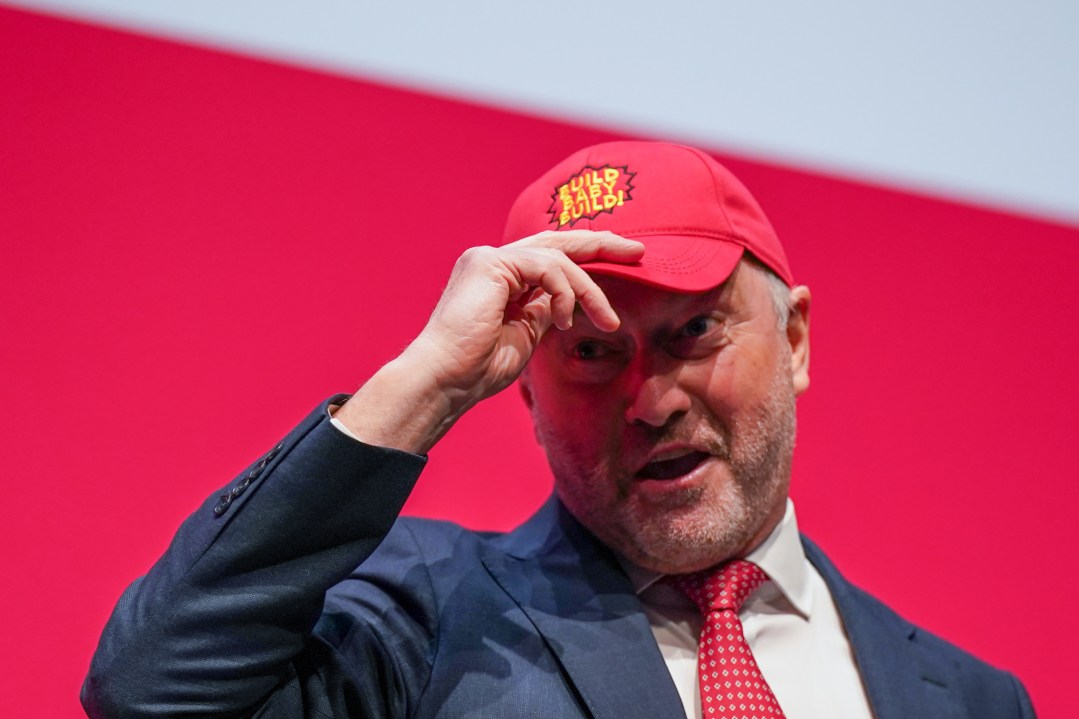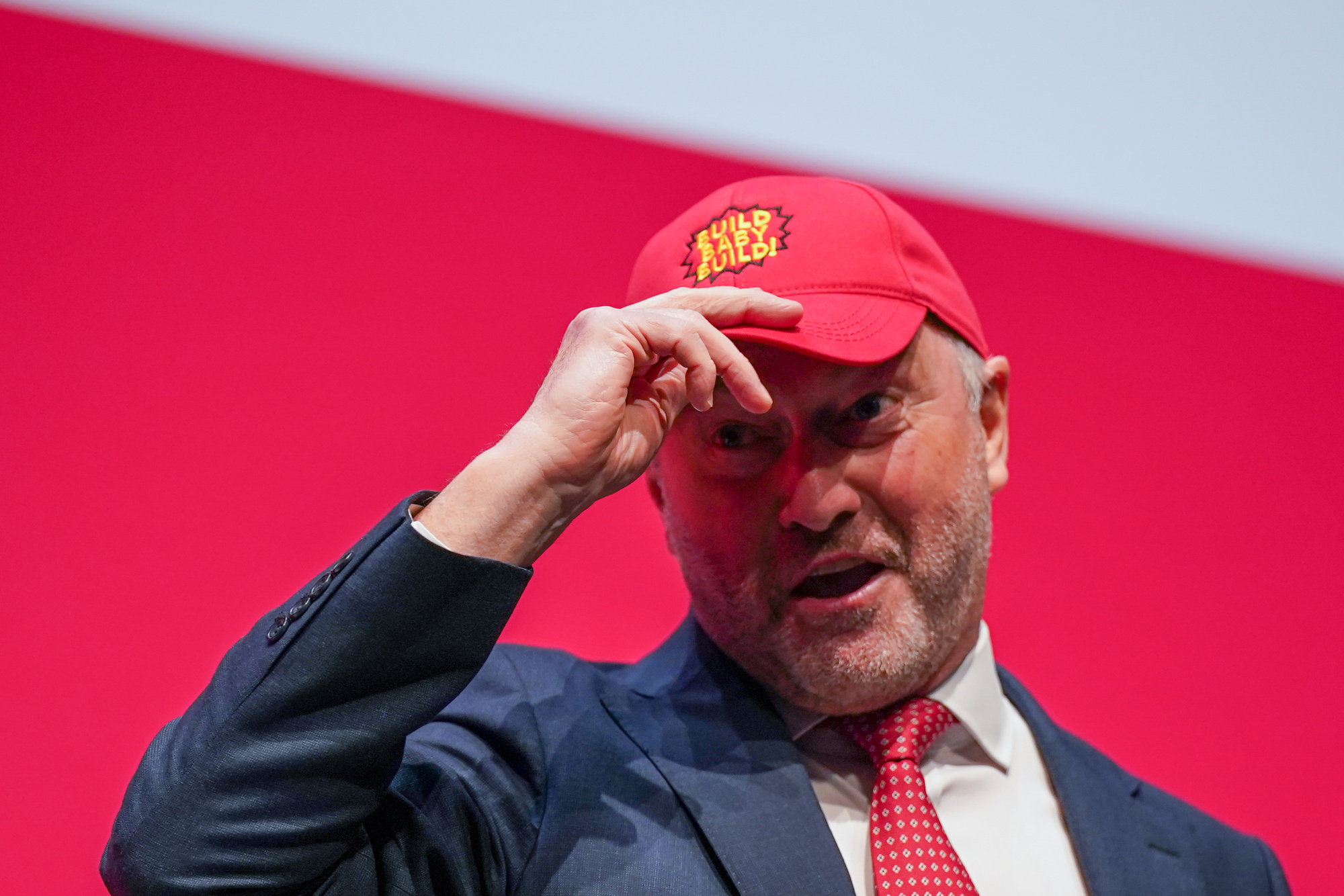There are too many middling politicians in this country who look at Donald Trump with envy. I might not like his politics, they think, but isn’t he such a great communicator? Don’t you see how good he is at speaking to normal people? What could we learn from this? The answer, of course, is nothing.
History tells us that governments can ask for huge increases in the volume and speed of house building, or a proper focus on quality and safety, not both.
Trump succeeds at being Trump because he is nothing like most politicians. He has built a character over decades of TV series, pro-wrestling cameos and a flashy, moneyed, highly public life of excess. Staid, serious politicians on this side of the Atlantic only embarrass themselves by attempting to ape his style.
All of which brings me to our new housing secretary, Steve Reed, who gave his speech to Labour’s party conference while wearing a red Maga-style hat emblazoned with his new slogan: ‘build baby build’.
Reed is nothing like Trump. He’s a man from Hertfordshire in his early 60s, who has spent most of his career in the serious-but-dull world of local politics in south London. Trump can fire up a stadium of passionate supporters with a slogan like ‘drill, baby, drill’. When Reed, a former deputy chair of the Local Government Association, tries it he comes across as a bit weird.
But there are bigger problems with Reed’s new slogan than its monumental levels of cringe.
His appointment comes at a pivotal moment for housing policy in the UK.
The Labour party pledged to build 1.5 million new homes this parliament – a target it is currently on course to miss badly. All the relevant construction output data indicates that this won’t be turned around any time soon. This stands to be a political embarrassment and a major economic headache – given that Rachel Reeves’s budget calculations are predicated on the economic windfall from a major rise in house building.
The result is that a faction of self-described ‘Yimbys’ (pro-housebuilding cheerleaders), who have always had influence over Starmer, have taken over.
Reed, who replaced Angela Rayner following her fall from grace last month, is a full-throated Yimby and has promised to ‘pull any lever’ to deliver his Trumpian promise. The trouble is the levers his faction want pulled are things many regard as good: minimum space standards, enforcement of fire safety regulations, overheating rules, environmental protections, affordable housing requirements and so on.
If Reed wants to understand the folly of this approach, he need only attend his own civil service briefings. It is bitterly ironic that we have a Housing Secretary who wants to charge into housebuilding at all costs when his department is barely a third of the way through cleaning up the mess made by this sort of policy in the very recent past.
More than 5,000 buildings with ‘life critical’ defects have been identified since the Grenfell fire in 2017, 419 of them so serious that they had to be immediately evacuated rendering all of the residents homeless. Just 34 per cent have so far been fixed. The total cost will be more than £16.6 billion, paid for by a combination of taxpayers, developers and those unlucky enough to live in the buildings themselves.
This has had huge social consequences, directly impacting the lives of more than half a million people who have been stuck in a miserable, never-ending nightmare of having an unsellable flat in a dangerous building.
It is also undoubtedly a legacy of successive governments who cared more about increasing the volume of housebuilding than the quality of what was being built.
Indeed, we are barely a year on from the Grenfell Tower Inquiry concluding that a government focused on housing targets and economic growth allowed enthusiasm for deregulation to ‘dominate [its] thinking to such an extent’ that matters impacting life safety were ‘ignored, delayed or disregarded’.
Less than 48 hours after his speech, Reed’s department published its latest update on its work to meet the over 60 recommendations from this inquiry. Needless to say, ‘build, baby, build’ was not among them.
After eight years of revelations about the way builders and contractors gleefully ignored or manipulated rules which were already far too permissive, it is profoundly depressing to have a government intent on handing that same industry free reign to ‘build baby build’.
I’ve been to blocks where the only way out of a flat is a timber walkway that would burn like a matchstick in fire, and towers clad with decorative panels made of plastic which is chemically the same as solid petrol. I have heard stories of crisp packets found stuffed in cavities, the workmen not bothering to install fire breaks and instead finding a convenient place to dump the litter from their packed lunch.
The problem is not just about fire safety. Our new builds over the last decade have been plagued with quality issues: plastic piping that leaks weeks after completion, staircases that collapse, district heating systems that chronically malfunction. There are recently built buildings with concrete so poor that they need total demolition to prevent collapse.
Reed is well aware of this last example, Citiscape in Croydon. It is in his constituency and as a backbench MP, he picked up the baton of representing the residents impacted – calling the situation ‘outrageous’ and eventually helping to pressure the developer, Barratt, into stumping up the funds to pay.
Reed will no doubt insist that there will be no compromise on safety standards – but that ignores the lessons of history that go right back to the prefabricated concrete debacle of the 1960s. History tells us that governments can ask for huge increases in the volume and speed of house building, or a proper focus on quality and safety, not both.
Quality is not the only reason to question such a reductive statement of intent from the housing secretary. What do we really expect to happen if we remove all restrictions and let volume housebuilders loose to do as they please? That they will merrily build enough homes to bring down prices and solve the housing shortage?
This is so naive as to be ludicrous. We have had major reviews by the Competition and Markets Authority and the government itself which suggest that the problem is less the blockages imposed by planning rules, and more the model of private housebuilding itself. Volume house builders are sophisticated, listed businesses. They have no interest in reducing the value of their only product. Instead, they calculate the rate at which their homes can flow onto the market to sustain prices and profits.
Reed is said to be considering a cut to the number of affordable homes builders are required to deliver. It’s hard to see how this is a gift to those who can’t afford a home, or anyone at all except the shareholders in the housebuilders themselves.
The truth is that housing policy is complicated and involves difficult decisions and trade-offs at almost every turn. Yes, we need more supply, but we also need homes which are more affordable, supplied with sufficient infrastructure and which give people the chance to live in communities rather than identikit boxes on the outskirts of towns – as well as dozens of other complexities from catering to an aging population to considering future flood risks.
Working out the way forward isn’t easy, but it is the job of serious politicians to at least try. That requires strategy, trade-offs, imperfect answers, compromise and a willingness to at least hear dissenting voices – not branding everyone who questions you a ‘blocker’ or NIMBY, and hiding behind a slogan that is as childish as it is facile.
For Reed, the buzz of his cosplay populism will soon fade. He has had his fun being cheered by delegates and surrounded by sycophantic think tank wonks who share his taste for silly hats. But the reality of the state of the economy and the size of the mess he has inherited will soon dawn on him.
In the coming weeks, he is likely to meet with leaseholders whose lives have been turned upside down by the building crisis, as well as survivors of the Grenfell Tower fire. When he attends these meetings, he would be well advised to leave his new baseball cap at home.








Comments